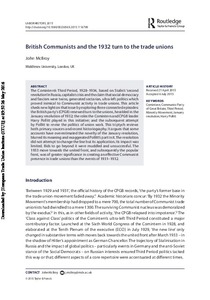British communists and the 1932 turn to the trade unions

2015
56
5
December
541-565
communism ; history ; political party ; trade union
Trade unionism
http://dx.doi.org/10.1080//0023656X.2015.1116789
English
Bibliogr.
"The Comintern's Third Period, 1928–1934, based on Stalin's ‘second revolution' in Russia, capitalist crisis and the claim that social democracy and fascism were twins, generated sectarian, ultra-left politics which proved inimical to Communist activity in trade unions. This article sheds new light on that issue by exploring three connected episodes: the British party's (CPGB) renewed turn to the unions, heralded in the January resolution of 1932; the roles the Comintern and CPGB leader Harry Pollitt played in this initiative; and the subsequent attempt by Pollitt to revise the politics of union work. This triptych reviews both primary sources and recent historiography. It argues that some accounts have overestimated the novelty of the January resolution, blurred its meaning and exaggerated Pollitt's part in it. The resolution did not attempt to change the line but its application. Its impact was limited. Bids to go beyond it were muddled and unsuccessful. The 1933 move towards the united front, and subsequently the popular front, was of greater significance in creating an effective Communist presence in trade unions than the events of 1931–1932."
Digital
The ETUI is co-funded by the European Union. Views and opinions expressed are however those of the author(s) only and do not necessarily reflect those of the European Union or the ETUI.